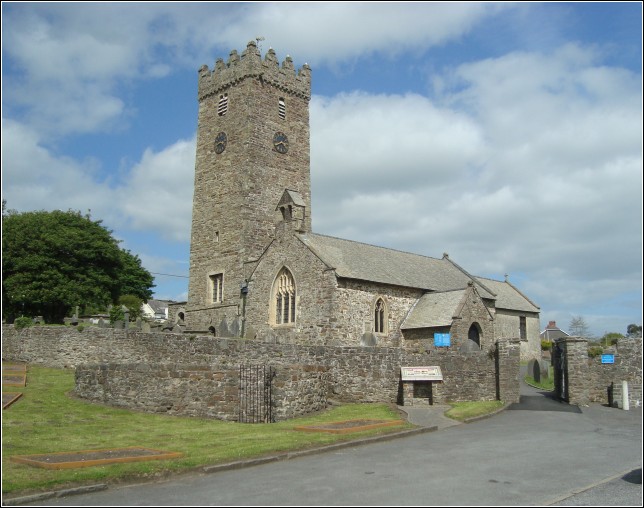From the Vicar.
Monday, April 20th 2020. The weeks pass by in our ‘Lockdown’ experience. We start week five. Ministry has continued by telephone or text message; a two-weekly cycle of checking that people are safe and well. This period has rather forced my hand. Not one to be easily drawn to the marvels of communication technology, I eat humble pie in admitting that the potential is amazing. ‘Skype’ and ‘Facebook’ have meant being able to speak face-to-face with people and friends from years gone by who have ‘re-connected’.
I am not one to have a large circle of friends; no Filofax of names and contacts. I guess it depends on personality; some more introvert than others. Whether the group is large or small, friendships are so important. Friends sustain us because, in true friendship, we can be truly ourselves. These are the people with whom we share our deepest thoughts; our hopes as well as our fears. It is friendship that somehow enables us to be ourselves, even at our most irritating, because there is something that goes deeper than the need for social contact. Friendship, at its best is a form of love. It creates a safe space for sharing and caring at a sometimes profound level.
In the post-Easter narrative given to us by Luke, the third Gospel, we find an account of two friends on the road to Emmaus. The detail the author gives us is touching. We are told that on their journey a ‘stranger’ comes and walks with them and on being asked what it is they are discussing that ‘They stood still, looking sad’. Their conversation, we are told, revolved around ‘all these things that had happened’. The reference is to the Crucifixion of the One whom they had set their hopes on. He who had preached about the coming topsy-turvy Kingdom which would usher in a new way of being human; a new set of values; a revolutionary challenge to both religious and political ( with a small ‘p’) way of thinking. The fulfilment of the sometimes thorny message of the Prophets that had preceeded Him. That vision, all that hope, seemingly lay in tatters.
The ‘stranger’ journeys on with them, engaged in conversation and eventually ‘opening their eyes’ so they may at last understand how God had actually worked through all that had happened. It wasn’t that the vision and dream had failed; rather it had been accomplished, but not as they expected. And they needed this new found ‘friend’ to help them see it. The narrative ends with their recognition of He who now Lives through the symbolic act of ‘Breaking bread’.
Friendships can be like that. Conversations can help us see more clearly, reflect on our circumstances and put things in their proper perspective. Even those worries or hopes we wouldn’t feel comfortable telling family or colleagues. Within Communities of Faith, friendship is such an important element, as in other circles. Friendship within the ‘Body of Christ’; our common, struggling, humanity.
For many years I have been an admirer of the writing of the late Canon Eric James. He was an Anglican priest, Preacher to the Inns of Court in London and former Chair of Christian Action, amongst other posts he held. A frequent broadcaster on BBC Radio 4’s ‘Thought for the Day’ in past years. In his book ‘The House Of My Friends’ he recollects how important friendship is, and how it can reveal something of God:
‘It’s in and through my friends that I think I have learnt, and still do learn, most about God, and receive most from him’. I’m sure he would have qualified that by saying that Scripture and Sacraments are foundational in that revelation, but God, ultimately, must use some agency to communicate Grace. And friendships, at their best, are surely one such way.
Over the last number of weeks I imagine others have experienced the same as me. Old friends telephone to ask if all is well; new friendships might be forged simply because new needs now have to be met. Volunteers delivering to the house-bound come to know people they would otherwise have never met or spoken to. A corporate sense of ‘all being in this together’ gives birth to a new cohesion and determination ‘to make it work’.
And in all of this, through caring and sharing, as much as that is possible; through small acts of kindness that reveal Grace, the Risen Christ makes Himself known. Perhaps not necessarily in the ‘breaking of the bread’ but in its delivery. The ‘anonymous Christ’ that the theologian Karl Rahner spoke of in the 1960’s. The Risen Christ who comes to us in many guises. Let’s not be arrogant and think this only applies to the ‘Saved’. Did not He who walked the dusty roads of Galilee not come to break down walls that divide? What right has any Institution, however sacred it may be, to place limits on that ‘wind that blows where it will’?
In his book Canon Eric James includes in his circle of ‘friends’ people he’d never met but who, through their writings or compositions brought comfort, insight and inspiration. He included poets, people who can see truth in the sometimes apparently random nature of life. I include in my circle of ‘friends’ poets, dramatists, musicians and artists. Through their work it’s as if a hand reaches out and a shared experience is realised. Amongst them is A.E.Housman’s work ‘A Shropshire Lad’. In his poem ‘On Wenlock edge’ he reflects on human history; how others had been there before: ‘The tree of man was never quiet: Then ‘twas the Roman, now ‘tis I’.
Whatever experiences we are going through at present, the Risen Christ walks with us and whatever challenges we face today, others, admittedly at a different point in history, have struggled too; and overcome.
Prayers for Our Times
Lord of the Emmaus Road,
Be with us on our journey through these days.
Somewhere, sometime, people will be sad.
They too, like the two friends, will be down-cast because
Dreams for the future have come to nothing.
But You enlivened their spirits with the knowledge
Of Your presence; sustaining and encouraging.
Bless all our friendships, and through them
Help us to see You. Amen
We thank You, Lord, for all the people
Who help us carry on living as normally as possible.
For all our community services; refuse collectors, shops large and small,
Milkmen (and women!), home-delivery agents;
Our hotels supplying door-step serving of lunches
And for those, who, in commerce try to keep business ‘as usual’.
We remember our hospital Chaplains and Funeral Directors,
Who, through their care, try to bring dignity to the dying
And bereaved. For those who Officiate at funeral services;
That they may have sensitivity and understanding.
Through all of them, may we experience your presence.. Amen.
Canon Dewi Davies.
Help keep news FREE for our readers
Supporting your local community newspaper/online news outlet is crucial now more than ever. If you believe in independent journalism, then consider making a valuable contribution by making a one-time or monthly donation. We operate in rural areas where providing unbiased news can be challenging. Read More About Supporting The West Wales Chronicle





















